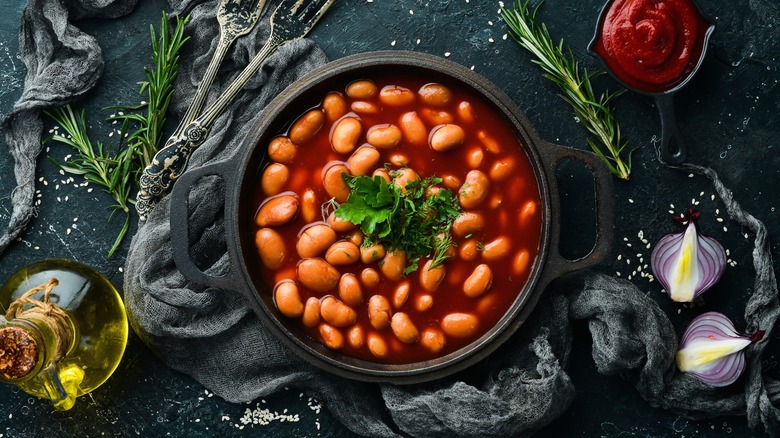The General Ratio To Follow When Adding Salt To Beans
Cooking beans from scratch seems straightforward — add them to a pot of cold water and cook till tender. However, there's a trick to getting them just right, especially when it comes to salting. Beans are like little sponges — they soak up flavors, and if you're not careful, they can end up bland or overly salty. So, how much salt should you add to your beans? The answer isn't one-size-fits-all, but there's a general rule of thumb that works wonders: for every pound (about 2 cups) of dry beans, use about 1 tablespoon of salt.
It's important to understand the type of salt you're using, too. Table salt, kosher salt, and sea salt aren't the same by weight. Table salt is more compact and salty than kosher salt. If you're using kosher salt, consider using a bit more, perhaps closer to 2 tablespoons. When in doubt, though, it's always better to use less salt to begin with since you can add more later rather than end up with an overly salty dish that you can't reverse.
When is the ideal time to salt your beans?
Knowing when to add the salt is just as important as knowing how much to add. Salting beans at the beginning of cooking is fine. Contrary to some opinions, it won't harm the beans' texture, and will, in fact, help them cook uniformly and maintain intact skins. Moreover, it gives the salt ample time to work its way into the beans, creating a deeper, more even flavor.
Remember, beans often need a soaking period before cooking, especially the larger varieties. This isn't just about shortening cooking time; soaking also helps beans cook more evenly and can improve their digestibility. If you choose to soak your beans, you can salt the soaking water and drain afterward, then salt the cooking water as well. Finally, consider the dish you're making. If you're adding beans to a recipe with salty ingredients like broth, cheese, or cured meats, you'll want to dial back the salt you add to the beans themselves. It's all about balance.

